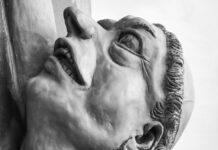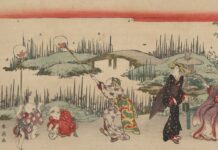
When he retired from walking through the Empire leaving behind him poems and straw sandals, Hsi-wei had been presented, formally by the governor but actually by his wife, with a modest cottage three li outside Chiangling. It was here that Fang Xuan-ling, a minister of the new Tang dynasty, visited the poet in his retirement. Fang’s stay was lengthy, more than week. He was given comfortable quarters in the city and rode out to Hsi-wei’s little cottage each day with plenty of food and drink. They spent the afternoons in conversations of which Fang kept careful notes, especially Hsi-wei’s accounts of the sources of his poems. Each night, the minister added to his memoirs. The following passage is noteworthy on two grounds: it includes an explanation of one of Emperor Wen’s earliest, most significant, and durable reforms along with also a transcription of one of Hsi-wei’s earliest poems—perhaps even his first.
When I heard of the peasant/poet Chen Hsi-wei and read some of his poems, I was curious about his days as a student in Daxing. I knew the story of how a message had been inscribed on his scalp when he was an illiterate boy, a message he was to try to deliver to Wendi’s army in the south. I knew he was not the only boy with fast-growing hair sent in the cauldron but the only to fulfill his mission. I knew the story of how, after his safe return, he had astonished the court by turning down the customary rewards of money, land, and women, begging instead for an education. I could picture the surprise and amusement of the grandees of the new regime. An educated peasant would be a novelty, a figure of fun, someone to be mocked and put in his place. I was not far wrong. Master Hsi-wei told me about the harshness of his teacher, Shen Kuo, who resented being ordered to teach a peasant boy. He spoke of the old man’s strictness and constant fault-finding, the slighting nicknames he was given, how he was humiliated before the other pupils. Yet, Hsi-wei said that he was grateful all the same. I have done my best to recall what he said of the matter.
“I benefited from the Master’s high standards. It is better to be rebuked for not measuring up than to be told one’s miserable efforts are good enough. I didn’t see it at the time but, in his way, Master Shen did his best for me, for the peasant boy whose calligraphy he compared to a bulbul hopping through a puddle of ink. I came to understand that, even as he was calling me a low-life mongrel, a peasant who would be a half-wit if he had half a wit, he was showing me some respect. And it was Master Shen, after all, who showed my first finished poems at court. So, in the end, my teacher must have been a little proud of me, even if he was prouder of himself. Some years later, I was told what he said when he handed my poems to the First Minister who had foisted me on him.”
“What did Shen say?”
“Look what I have made of this riff-raff.”
“So, you were a kind of advertisement for his methods? Was that respecting you?”
“It doesn’t matter, my lord. It was my teacher’s esteem I despaired of and yearned for. Did it matter that he regarded me as a cur he had trained to dance? What counts for the dancing dog is his master’s approval.”
When I asked about his first efforts to compose poems of his own, Hsi-wei smiled and said they were so poor he didn’t dare show them to anyone, not his fellow pupils and certainly not Master Shen. “I was absorbing ridicule enough as it was. Those early verses I burned and resolved to do better. It was the better ones Master Shen took to court.”
“You burned all the early ones?”
“Yes. Well, all but one, my lord. I kept that one to remind myself of how poorly I wrote.”
I felt the thrill of a scholar who catches the scent of a rare find. So, there was an early poem no one had seen. I understood why Hsi-wei destroyed his juvenilia—who isn’t ashamed of such things? Why had he chosen to preserve just one, and why that one.
I asked.
Hsi-wei didn’t respond at once. He was silent for a while, perhaps trying to recollect a decision made decades before. Finally, he replied, “I suppose it’s because it connected me to the new dynasty, the new Emperor, to Wendi.”
Hsi-wei had reservations about Emperor Wen and his brutal rise, about his absolute authority and how easily it could be abused, about the contradiction between his promotion of Buddhism and his aggressive military operations. Hsi-wei had the sort of suspicions any peasant would have of the powerful. But I was aware from his poems and our conversations how he admired the first Sui emperor. I knew also how much he despised the second, the late Yangdi, whose overthrow ended the Sui and led to the enlightened and benevolent rule of Gaozu whom it is my privilege to serve.
“I would very much like to see that poem, Master Hsi-wei. Is it too much to ask?”
Hsi-wei frowned. “The painter will not show off a botched picture. The instrument-maker will destroy a spoiled liuqin. Still, my lord, I find it hard to deny you anything. I’m embarrassed by that poem, but I confess to a fondness for it, the kind a father might feel for a deformed but affectionate child.”
“Can you at least say what the poem is about, how it is connected to Wendi?”
Hsi-wei cleared his throat and sipped some wine before answering. He smiled as he spoke. I think it gave him pleasure to think back on the painful yet exhilarating time when language and poetry were as new to him as the Sui dynasty was to China.
“I did have some friends among the other students. One of them was Zheng-du, a child of the powerful Huang family. The boy’s uncle had been among the generals who conquered the south, and he had been rewarded with a high position in Wendi’s new Ministry of War. The uncle saw his Zheng-du regularly and would sometimes tell him about the goings on at court. Sometimes Zheng-du would share those stories with me. They were mostly just gossip but one story was serious, about a mattaer of policy, and it attracted me. I drew as many details from my friend as he could recall, and he told me enough so that I could imagine myself being on the spot myself.
“A delegation of peasants and tradesmen came to Daxing to complain about their local prefects and magistrates, leftovers from the old regime of Southern Zhou. They accused these officials of favoritism, nepotism, imposing illicit taxes in the Emperor’s name, appropriating land and handing it over to members of their relatives. They said they had come hoping for justice from the new Emperor. As a peasant, I considered them brave to have come to the capital and, as I shared their hopes, I was pleased that they were not beaten and sent away. Instead, Emperor Wen himself listened to them, questioned them, then ordered the Minister of Personnel to conduct a thorough investigation. This was something new in their experience and mine—an emperor with ears. But what drew me even more was that the incident led to a public debate I thought would have far-reaching consequences, as it did.
“According to what Zheng-du told me, Wendi asked his ministers how they thought officials should be assigned. Everyone was surprised by the question. The Minister of Personnel replied—no doubt with deference, but with certainty. He said that those passing the examinations, a practice so wisely restored by the Son of Heaven, would naturally be sent back to their home provinces where they would know the dialect, customs, which of the leading citizens was trustworthy and which were not, and where they could rely on local informants. Being drawn from local populace, they would be seen as representing both the people and the Emperor, as good mediators. Ideally, the people would be proud of them, see them as upholders of justice and also advocates for them with the government in Daxing, and so the people would be the more obedient to the laws and dictates issuing from the capital.
“There was general agreement with this explanation of the traditional way of doing things. Nevertheless, the Emperor asked if anyone had a different opinion. After a long silence, one man did speak up. This was an old scholar named Tseng Bo-li, a conservative Confucian and student of history. He had once served as a tutor to the ruling family of Northern Zhou, including the Emperor. Wendi kept him at court out of respect for his old teacher and for his erudition. This Tseng was a curious figure, my friend’s uncle had said, seldom seen because he spent his time with old scrolls. He had never before spoken up in court.
“I could picture the scene. The old man would have bowed to Wendi and spoken in a quavering voice. He said that there are good people in both the north and the south; that is, men who prize integrity and love justice—women too. Some of them are well-off, others poor but, taken all together, they are a small minority. He praised the Emperor for uniting China for the first time in three centuries. He said that Wendi building a great empire which, like a great palace, requires a large foundation. It is prudent, the old man said, to build on firm ground, land that won’t shift. An understanding of human nature is essential to that foundation; and so, in his view, it is wise to assume that give the chance people will enrich themselves, exalt their families, and oblige their friends. This, he said, would be true even of those who passed the imperial examination and could recite the worthy and wise strictures of Kongzi.
“It seems the Minister of Personnel grew impatient and asked Tseng if he had a point. The old scholar said that the point wasn’t his but that of the Han dynasty which had lasted four hundred years. The Han, he said sharply, forbade the posting of officials to their places of birth. Why? Because they would be subject to the influence of their relatives and corrupted by their friends, just like those southern prefects and magistrates about whom they had just been hearing.
“The Emperor asked if anybody else wished to speak. No one did. Wendi said he wished to consider everything that had been said and ordered the court to gather again in the morning. It was then that Wendi declared the policy that came to be called the Rule of Avoidance, saying he agreed with the Han and would go even further than they had. Not only would prefects and magistrates be forbidden to serve in their home provinces, but they would remain in their assigned posts for no more than three years. Moreover, no male children over the age of fifteen would be permitted to accompany them. Governors would be charged with overseeing prefects, as prefects were to supervise magistrates. Careful records were to be kept of the activities, decisions, and judgments of all officials and, every year, all governors and prefects would have to come to the capital to submit their records for examination by the Ministries of Justice, Personnel, and Finance.”
There was no need for Hsi-wei to point out that this policy had proved so successful that our new Emperor has wisely chosen to preserve them.
“So,” I said to Hsi-wei, “you wrote a poem about Wendi’s new policy, the Rule of Avoidance?”
“A very poor poem, yes.”
“I truly would love to see it, Master Hsi-wei.”
“I truly would like to bury it, my lord.”
“Yet you’ve kept it all these years. It can’t just be to preserve humility. You’re already the least boastful man I know—certainly the most modest of poets.”
Hsi-wei raised his eyebrows, suggesting that I what I said showed some insight. I pressed my advantage by speculating on the importance of those early verses.
“Perhaps you’ve kept that poem as a memento of a difficult but crucial time in your life, of the self you were then. I can also imagine you’ve held on to the poem because it marks the moment when you leapt from transcribing the Shijing masters to joining them. I can also understand that you preserved the poem as a tribute to the Emperor you admired.”
“Very well,” said Hsi-wei with a sigh and a shrug of resignation. “I’ll show it to you, my lord, wretched thing that it is.”
Hsi-wei got to his feet, went into his cottage, and returned with a small cylinder of yellowed paper tightly tied up with cobbler’s twine.
In his memoir, Feng Xuan-ling writes that, as usual, Hsi-wei did not give his verses a title. However, when he reproduced this early effort, the Feng supplied one, “The Rule of Avoidance.”
Before taking up a post in Daxing
A trusting landlord from Kwan
Chose his three nephews to
Look after his property.
They left his dogs off the leash,
His pigs without a pen,
His villa without a wall,
And the river without dikes.
In springtime, the Nanpan overflowed,
In winter, robbers ransacked the villa,
In fall, pigs trampled the fields,
In summer, the dogs all ran off.
Wise boatmen do not trust the current.
They steer clear of jutting rocks
And keep well away from sandbars,
Misplaced trust is always costly.
Nephews can be unreliable.
A hired stranger from Longxi
Would have done a better job.
Avoidance is better than remedy.
To read more Hsi-wei tales, click here
About the Author

Robert Wexelblatt is a professor of humanities at Boston University’s College of General Studies. He has published ten collections of short stories; two books of essays; two short novels; three books of poems; stories, essays, and poems in a variety of journals, and a novel awarded the Indie Book Awards first prize for fiction.
















